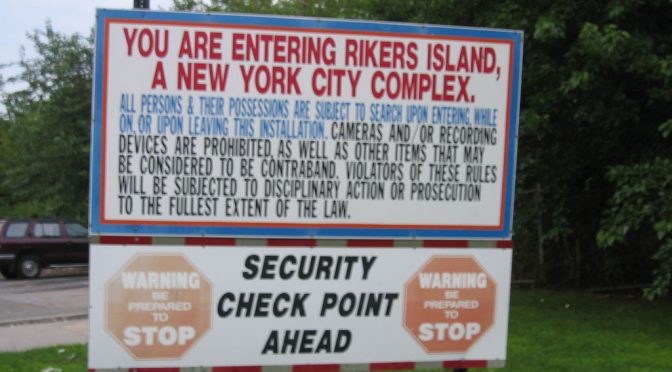The fight to close the Rikers Island Jail complex has received renewed attention since Mayor Bill de Blasio announced a plan last March to close down the facility in the next 10 years. Many have welcomed the moved, but one group has expressed resistance: correctional officers.
In a recent article in the Daily News, Brooklyn College sociology professor Alex Vitale argues that this resistance is misguided:
Corrections unions face a difficult challenge in the months and years ahead. Do they continue to defend a broken institution in the hopes of saving jobs or do they look for concrete ways to ensure that the people who work at Rikers have secure economic futures?
The irony of this dilemma is that the men and women who work at Rikers know better than almost anyone what a failed institution it is. They see day in and day out the deteriorating infrastructure, inadequate management, and culture of violence that organizes their daily work life.
While prisoners and detainees have their own stories of mistreatment, abuse and neglect, many of them are there for only short stints. The guards and other workers at the jail must return day after day over long careers. While guards enjoy the benefits, pay and security of a Corrections job, most of the dozen or so that I have spoken with over the years hate the working conditions.
Vitale argues for a systemic approach to solving for job loss while addressing the inhumanity of mass incarceration:
Corrections workers and their union should be calling for job transfers instead of defending a failed institution. While some workers can have their positions shifted to new smaller facilities that are likely to be less dangerous and onerous to work in, other will need to have their employment shifted to other areas of city government with no loss of pay or benefits.
Ultimately, he notes, the process will be complicated. He argues that the Murphy Institute could play a crucial role in helping find a way forward:
The Murphy Institute for Labor Studies at CUNY could play a role in facilitating this process. Last spring, they hosted a two-day conference on law enforcement unionism in which many of these issues were discussed. They could provide assistance in identify similar schemes in other places and how to navigate the complexities of New York City’s civil service system.
It’s time for COBA, SEIU 1199, DC 37, and other unions that represent workers at Rikers Island to acknowledge that change is coming and take steps to protect their members’ long-term interests, rather than fighting a losing battle to defend an institution whose time has run out.



